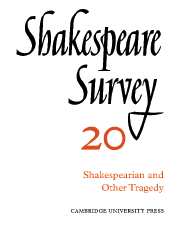Book contents
- Frontmatter
- Shakespeare, Fletcher and Baroque Tragedy
- Seneca and the Elizabethans: A Case-study in ‘Influence’
- George Chapman: Tragedy and the Providential View of History
- Critical Disagreement about Oedipus and Hamlet
- Shakespeare’s Thematic Modes of Speech: ‘Richard II’ to ‘Henry V’
- Anarchy and Order in ‘Richard III’ and ‘King John’
- The Staging of Parody and Parallels in ‘I Henry IV’
- Shakespeare’s Unnecessary Characters
- Walter Whiter’s Notes on Shakespeare
- Shakespeare’s ‘Romeo and Juliet’: Its Spanish Source
- The Grieves Shakespearian Scene Designs
- Shakespeare on the Modern Stage: Past Significance and Present Meaning
- Shakespeare in Brazil
- Recent Shakespeare Performances in Romania
- Shakespeare, the Twentieth Century and ‘Behaviourism’
- The Year's Contributions to Shakespearian Study 1 Critical Studies
- 2 Shakespeare’s Life, Times and Stage
- 3 Textual Studies
- Index
- Plate section
Walter Whiter’s Notes on Shakespeare
Published online by Cambridge University Press: 28 March 2007
- Frontmatter
- Shakespeare, Fletcher and Baroque Tragedy
- Seneca and the Elizabethans: A Case-study in ‘Influence’
- George Chapman: Tragedy and the Providential View of History
- Critical Disagreement about Oedipus and Hamlet
- Shakespeare’s Thematic Modes of Speech: ‘Richard II’ to ‘Henry V’
- Anarchy and Order in ‘Richard III’ and ‘King John’
- The Staging of Parody and Parallels in ‘I Henry IV’
- Shakespeare’s Unnecessary Characters
- Walter Whiter’s Notes on Shakespeare
- Shakespeare’s ‘Romeo and Juliet’: Its Spanish Source
- The Grieves Shakespearian Scene Designs
- Shakespeare on the Modern Stage: Past Significance and Present Meaning
- Shakespeare in Brazil
- Recent Shakespeare Performances in Romania
- Shakespeare, the Twentieth Century and ‘Behaviourism’
- The Year's Contributions to Shakespearian Study 1 Critical Studies
- 2 Shakespeare’s Life, Times and Stage
- 3 Textual Studies
- Index
- Plate section
Summary
The 1794 edition of Walter Whiter’s Specimen of a Commentary on Shakspeare is notable for its anticipation of much that is regarded as modern in the criticism of Shakespeare’s language and imagery. Because of his interest in Locke’s theory of the association of ideas, Whiter is able to discover the underlying chain of thought in many of Shakespeare’s characteristic expressions; and because of his etymological interests, he is often able to throw light on the problem of the individual word in Shakespeare’s text. A collection of notebooks and loose papers (Cambridge University Library, Catalogue Number Oo, ⅵ, 103–106) contains further comments on textual and interpretative problems in at least twenty-four of Shakespeare’s plays, excluding some of the histories and all of the Roman tragedies. These notes follow the general pattern of the Notes on ‘ As You Like It ’ in the first section of the Specimen. Some are mere jottings and quotations; others are presented as complete essays on a variety of topics. What follows is a selection of some of this additional material not used in the Specimen.
- Type
- Chapter
- Information
- Shakespeare Survey , pp. 83 - 94Publisher: Cambridge University PressPrint publication year: 1967

